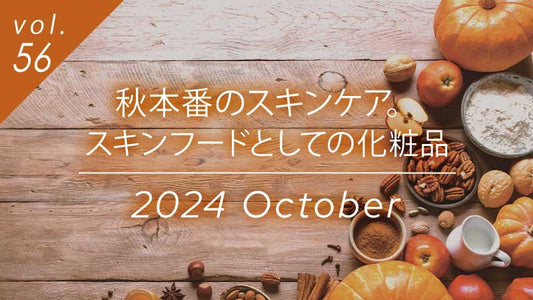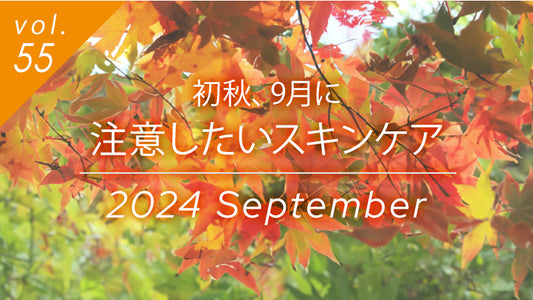
April... In the end, the cherry blossoms this year will bloom later than expected, and most areas are expected to reach full bloom after April. Last month, I mentioned that in Japan, March is a month that brings with it a strong image of "farewells," but on the other hand, April can be said to be a season of "change and encounters." April is a month of complete change in the environment, with students starting a new school year and semester, working adults starting a new job, transferring to a new workplace, and the start of a new fiscal year for Japanese government and companies, many of which close their fiscal year in March. These new changes in the environment can be said to be "fluctuations" that affect both beauty and health, and it is necessary to spend your time being aware of these "fluctuations."
This time, I would like to talk about a beauty lifestyle that takes into account internal stress in light of the environmental changes that are unique to April.
"Stress" caused by April's unique environmental fluctuations
1. External stress
In addition to temperature differences due to weather and climate, sunlight (ultraviolet rays, near-infrared rays), pollen, yellow sand, PM2.5, air pollution, and other airborne substances also cause great stress to the skin. Skin that has experienced a dry winter reacts sensitively (and sometimes excessively) to these stresses, causing skin problems as if it is screaming out in distress. Pollen, which peaks from March to April, and yellow sand, which peaks from April to May, attack in double numbers in April, so they can be said to be external stress factors that are particularly unique to April.
Temperature stress can cause temperature-related allergies and fatigue, which can have adverse health effects and cause skin problems. Even though spring is in full swing, the first half of April will see the cold winter air and the warm summer air swaying from north to south, creating conditions that are prone to large temperature differences in the mornings, evenings, and during the day. Be sure to dress appropriately to withstand the temperature difference.
As the summer solstice in June, when sunlight exposure reaches its peak, is just around the corner, and as you can feel the daylight hours getting longer every day, solar stress in April is approaching its highest level. This solar stress also attacks skin that has become sensitive and has weakened resistance after winter. It can be said that this is a time when photoaging is particularly likely to progress. Unlike the scorching sunlight of midsummer, April is a month when we tend to let our guard down, but it is important to be aware of how to protect yourself from solar stress by making good use of parasols, sunglasses, and UV-blocking outerwear.
People who develop allergic symptoms due to stress from airborne particles such as pollen, yellow sand, and PM2.5 should take medicine to suppress the symptoms. When you come home from going out, it is also effective to brush off any airborne particles that have adhered to your clothes in front of the entrance so that you do not bring them indoors.

2. Internal stress
April is also a month when many changes occur and can easily build up internal stress, such as new relationships at school or work, new duties due to a transfer or change of responsibilities for working adults, changes in commute routes and times, and resulting changes in meal times. If this internal stress becomes uncontrollable, it can cause various symptoms, which can not only harm your health, but can also lead to skin problems.
The cause of internal stress can be summed up in one word as "big changes in daily rhythms." In Japan, April is the month when many people face the biggest changes in their environment of the year, and the change in rhythm causes stress that accumulates and leads to various symptoms before people get used to the change. May Sickness is a perfect example of this. In order to be aware of this kind of stress and make a conscious effort to reduce or eliminate it, it is important to regularly establish the change as a new rhythm.

April and the autonomic nervous system
As mentioned above, April is the month when many people in Japan face the biggest changes in their environment of the year, and the change in rhythm causes stress that accumulates and leads to various symptoms before you get used to the change in rhythm. At times like this, you may feel a vague sense of fatigue or lethargy. This symptom may be caused by an imbalance in the autonomic nervous system. In this article, we will explain how the autonomic nervous system works and the lifestyle habits that can help balance the autonomic nervous system.
What is the autonomic nervous system?
The autonomic nervous system is involved in the functioning of the internal organs, blood vessels, and secretory glands, and regulates the internal environment. It operates 24 hours a day, 365 days a year, regardless of one's will. There are two types of autonomic nervous system, the sympathetic nervous system and the parasympathetic nervous system, which naturally maintain a balance and maintain vital functions.
The sympathetic nervous system is the nerve that leads the mind and body to activity, and is like the accelerator in a car, supporting the daytime activity period after waking up. It is the control tower that leads the mind and body to the ON state. On the other hand, the parasympathetic nervous system is the nerve that leads the mind and body to rest and relax, and is like the brake in a car, and is the control tower that leads to the OFF state.
When the balance between the "sympathetic" and "parasympathetic" nerves is disturbed, the function that unconsciously regulates and controls the body stops working, causing various disorders. As a result, poor health is directly linked to poor skin.

Balance and power of the autonomic nervous system
The sympathetic nervous system is dominant in the autonomic nervous system from the time you wake up in the morning until the daytime when you are at school or at work, while the parasympathetic nervous system is dominant after you get home or when you are resting or sleeping on the weekends.
In this way, our bodies work in a natural rhythm and balance, and it is important to maintain this rhythm and balance.
It is also known that there are differences in the power of the autonomic nervous system. The autonomic nervous system, which circulates throughout the body, has different power depending on the physique. Generally, men, who are larger in physique, have stronger autonomic nerve power than women because they are able to reach the extremities and activate the autonomic nerves. It is also said that the power of the autonomic nervous system decreases with age, regardless of gender. It is also important to live a life that is conscious of the normal functioning of the autonomic nervous system according to physique and age.
Maintaining the autonomic nervous system
To combat "internal stress," try to incorporate lifestyle changes that will help keep your autonomic nervous system in balance and functioning normally.
<How to switch to ON when you wake up in the morning>
●Get some sunlight.
●Drink a glass of water.
●Eat breakfast.
Let's encourage the switch from parasympathetic to sympathetic nervous system and awaken the mind and body.
<How to keep your sympathetic nervous system dominant during the ON period>
●Don't push yourself too hard when studying or working, and take frequent breaks.
● Drink soothing beverages frequently.
If you experience any physical symptoms such as palpitations, dizziness, or shortness of breath, rest as soon as possible and recover before resuming work. If there are no signs of recovery, consult a doctor immediately.
<How to avoid parasympathetic nervous system dominance during OFF time>
●Listen to relaxing music when you get home.
●Take a relaxing bath in lukewarm water.
●Enjoy a relaxing time after bathing with facial care using a moisturizing gel and body care using body lotion.
● Don't watch TV or use your smartphone until just before going to bed.
It is important to switch from the sympathetic nervous system to the parasympathetic nervous system, promote relaxation of the mind and body, and lead to good quality sleep.
<How to spend your holidays>
●Get into the habit of sweating through moderate exercise.
If you feel that you have an irregular diet during the week, make a conscious effort to eat a balanced diet.
As mentioned above, lifestyle changes that help maintain the normal functioning of the autonomic nervous system will also help increase resistance to internal stress and maintain a strong immune system.
We talked about a beauty lifestyle that focuses on internal stress in light of the environmental changes unique to April!
The next topic will be "Skin care in the best season: May."



